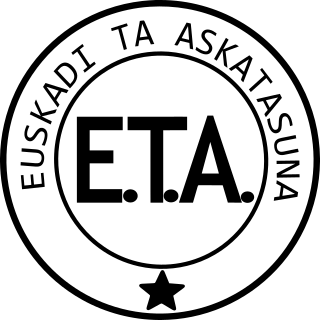
ETA, an acronym for Euskadi Ta Askatasuna, was an armed Basque nationalist and far-left separatist organization in the Basque Country between 1959 and 2018, with its goal being independence for the region. The group was founded in 1959 during the era of Francoist Spain, and later evolved from a pacifist group promoting traditional Basque culture to a violent paramilitary group. It engaged in a campaign of bombings, assassinations, and kidnappings throughout Spain and especially the Southern Basque Country against the regime, which was highly centralised and hostile to the expression of non-Castilian minority identities. ETA was the main group within the Basque National Liberation Movement and was the most important Basque participant in the Basque conflict.

Baltasar Garzón Real is a Spanish former judge. He served on Spain's central criminal court, the Audiencia Nacional, and was the examining magistrate of the Juzgado Central de Instrucción No. 5, which investigates the most important criminal cases in Spain, including terrorism, organised crime, and money laundering. In 2011, he was suspended from judicial activity and in 2012 he was convicted of illegal wiretapping and disbarred for a period of 11 years. During this time, Garzón legally assisted Julian Assange.
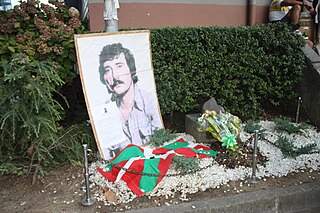
GAL were death squads illegally established by officials of the Spanish government during the Basque conflict to fight against ETA, the principal Basque separatist militant group. They were active from 1983 to 1987 under Spanish Socialist Workers' Party (PSOE)-led governments.
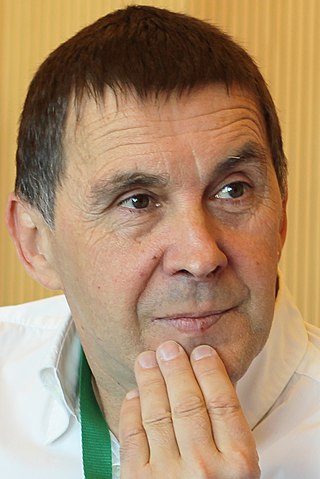
Arnaldo Otegi Mondragón is a politician from the Basque Country who has been the General Secretary of Basque nationalist party EH Bildu since 2017. He was member of the Basque Parliament for both Herri Batasuna and Euskal Herritarrok. He was a convicted member of the ETA, a banned armed separatist group organization, in his early years. He was one of the key negotiators during the unsuccessful peace talks in Loiola and Geneva, in 2006.
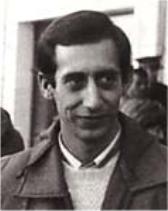
José Miguel Beñaran Ordeñana was a Basque militant and a key figure in the political evolution of the Basque separatist organization Euskadi ta Askatasuna (ETA). Often known by his nom de guerreArgala (Slim), he took part in the so called Operation Ogre, which consisted in the assassination of Luis Carrero Blanco, Spain's Prime Minister, in 1973. Five years later, he was in turn assassinated by a car bomb in Anglet, French Basque Country, by a group directed by far right members inside the Spanish Navy. This group reportedly received assistance from people such as former OAS member Jean Pierre Cherid, former Triple A Argentine member José María Boccardo and Italian neofascist Mario Ricci, member of Avanguardia Nazionale.
Communist Movement of Euskadi was originally the branch of the Communist Movement (MC) in Basque Country and Navarre, Spain. EMK was previously known as ETA Berri, a splinter group of ETA. EMK separated itself from MC in 1983. In 1991 EMK merged with LKI and formed Zutik in Basque Country. In Navarre EMK took part in forming Batzarre. Some of its most prominent leaders were Patxi Iturrioz, Eugenio del Río, Rosa Olivares Txertudi, Milagros Rubio, Jesús Urra Bidaurre and the brothers Javier and Ignacio Álvarez Dorronsoro.
José Ignacio de Juana Chaos, better known as Iñaki de Juana Chaos, is a member of the Basque separatist group ETA. He was convicted of killing 25 people in 1987 and was originally sentenced to 3,000 years in prison. As a result of complicated sentencing guidelines, he became eligible for release in late 2004 after only serving 17 years. However, the Spanish Government prevented his release by accusing him of making terrorist threats in two articles written from prison. In August 2006, he started a hunger strike protesting his continued imprisonment but it ended after sixty-three days. Another hunger strike occurred from November 2006 until March 2007, it ended after he was moved from a hospital in Madrid to one in his home region of Gipuzkoa. After he left the hospital he was to be placed under house arrest, but on 6 June 2007, after the end of ETA's ceasefire he was sent to Aranjuez prison. On 2 August 2008, de Juana Chaos was released from prison.

Former Peruvian President Alberto Fujimori was arrested, tried, and convicted for a number of crimes related to corruption and human rights abuses that occurred during his government. Fujimori was president from 1990 to 2000. His presidency ended when he fled the country in the midst of a scandal involving corruption and human rights violations.
A car bomb attack was carried out by the Basque separatist organisation ETA on 11 December 1987. A vehicle containing 250 kilograms (550 lb) of ammonal was parked beside the main Guardia Civil barracks in the city of Zaragoza, Aragon, Spain; its explosion killed 11 people, including 5 children. Another 88 people were injured, the majority of them civilians.
Emiliano Revilla is a Spanish industrialist who was kidnapped by the Basque separatist group ETA in 1988. He was captured on February 25, 1988, and freed on October 30, 1988.
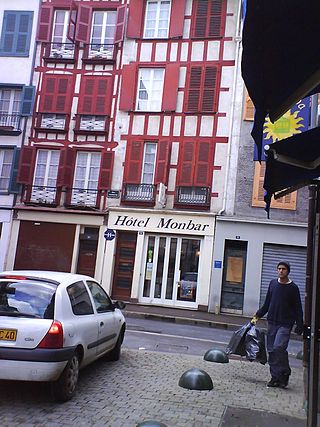
The Monbar Hotel attack was carried out by the Grupos Antiterroristas de Liberación (GAL), a Spanish state-sponsored death squad, on 25 September 1985 in Bayonne, Pyrénées-Atlantiques, France. The targets were four members of the Basque separatist terrorist group Euskadi Ta Askatasuna (ETA), whom the Spanish government believed to be senior figures in the organization, itself proscribed as a terrorist group in Spain and France. All four people were killed, with a fifth person, apparently unconnected to ETA, injured in the shooting. This represented the deadliest attack carried out by the GAL. Although two of the participants were apprehended shortly after the shooting, controversy surrounded the possible involvement of senior figures in the Spanish police.

The murder of Lasa and Zabala was one of the first acts carried out by the GAL, a state sponsored death squad, Basques José Antonio Lasa and José Ignacio Zabala were kidnapped, tortured and executed in 1983.
Basque National Liberation Movement prisoners are all those people who have been imprisoned, placed on remand, or otherwise kept in custody due to their illegal activity in support of the Basque National Liberation Movement.
David Pla Marín is a lawyer and Basque activist, who Spanish authorities believe to have been one of the three leaders of the Basque separatist group ETA at the time of the group's ceasefire declaration in October 2011. In 2000 Pla was condemned to six years imprisonment for planning an attack against the Mayor of Zaragoza, José Atarés. Pla is believed to be one of three people who read out the October 2011 ETA ceasefire declaration. He had previously been the leader of Basque separatist youth organisation Jarrai in the 1990s and had stood unsuccessfully as a candidate for Herri Batasuna in the 1995 local elections.

José Miguel Arenas Beltrán, popularly known as Valtònyc, is a Spanish rapper, originally from Mallorca, Spain. He describes himself as an independentist. His lyrics are based on an anti-capitalist, republican and anti-fascist ideology.

José Luis López de Lacalle Arnal was a Spanish journalist and trade unionist. A columnist for El Mundo newspaper, he was killed by ETA.
José Ignacio Iruretagoyena was a Spanish politician and victim of terrorism of the Basque separatist group Euskadi Ta Askatasuna (ETA).
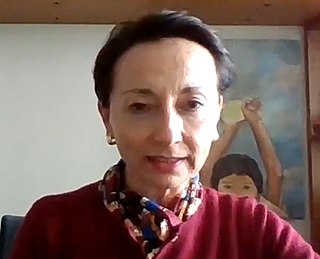
Gloria Ana Chevesich Ruiz is a Chilean lawyer and judge. She is currently a minister of the Supreme Court of Chile, and previously served as president and minister of the Court of Appeals of Santiago.
Enrique Rodríguez Galindo was a Spanish brigadier general of the Civil Guard, who was sentenced to 71 years in prison in 2000 for the kidnapping and murder of the alleged ETA members José Antonio Lasa and José Ignacio Zabala in the so-called Antiterrorist Liberation Groups case.











